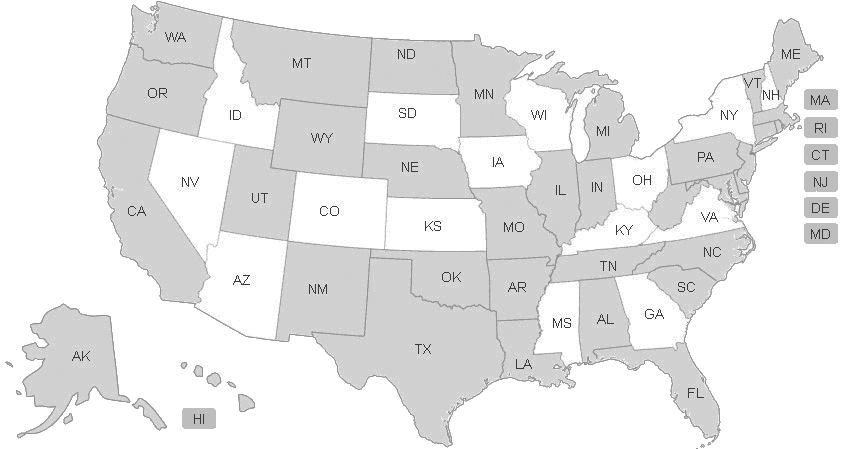Whether with state agencies or the U.S. Fish and Wildlife Service, wildlife officers represent a small and elite group. Becoming a game warden doesn’t come easy.
Most states make do with a very limited number of wardens covering a great deal of territory—Nevada, for example, employs only 35 wardens to cover 110,000 square miles. At the federal level, the 2013 budget sequestration deal has hit hiring at the U.S. Fish and Wildlife Service hard. With an estimated 15 percent cut in the agency’s law enforcement budget, around 200 jobs at national wildlife refuges have hit the chopping block. The agency employs only 216 special agents, a number that has not increased from its 1978 level. And more big budget cuts may be in the pipeline.
Yet at the same time, the position is incredibly popular among young sportsmen aspiring to the role and law enforcement professionals looking for a change of scenery. States are swamped with applications just to get on eligibility lists for open positions. In 2014, the Texas Park and Wildlife Department received 904 applications for 19 open positions at the state’s game warden academy. It’s easier to get into Harvard than to become a Texas game warden.
In this environment, agencies can and do demand highly qualified candidates, so any mistakes during the selection process means you’re out of the candidate pool. Successful candidates pay attention to every detail and don’t miss a step. Usually, they exceed the minimum requirements by a comfortable margin and make sure they stand out from the crowd.
Education and Experience Requirements
The exact education and experience requirements will differ somewhat based on the hiring agency. But most require some form of higher education and almost all value either on-the-job or voluntary experience in a related field.
A College Education Is The Best Preparation
Although a surprising number of game warden jobs do not require anything more than a high school education in theory, in practice the stiff competition for the few open positions means that most applicants will want to prepare by getting a bachelor’s degree in one of the following fields:
- Wildlife and/or Natural Resource Conservation
- Wildlife Ecology
- Biological Science (Specifically Wildlife Biology)
- Environmental Science
- Fish and Wildlife Management
- Criminal justice
Different warden positions can have different focuses that make one or the other of these degrees more desirable. In some states, such as Pennsylvania, Conservation Officers with the Game or Fish and Boating Commission have duties that place a heavy emphasis on environmental and ecological concerns. Degrees in fish and wildlife management or other sciences may be the best preparation for those roles.
In other states, such as Alaska, the job has more of a law enforcement component. Alaska Wildlife Troopers are part of the state troopers, and can even transfer back and forth between the divisions. A criminal justice degree is a better ticket toward hiring and advancement in that organization than one in environmental science.
But those guidelines can be flexible even within agencies. Different roles have to be staffed encompassing the full spectrum of warden duties. In the U.S. Fish and Wildlife Service (USFWS), for example:
- Federal Wildlife Officers (FWO) work in a dual law enforcement-public safety capacity similar to that of game wardens in state agencies, doing everything from environmental education and interpretation to enforcing conservation laws. In a role that involves everything from law enforcement to public safety to conservation, either criminal justice or natural resource conservation degrees would be useful.
- Special Agents with the USFWS undertake the sort of investigative work that any FBI agent would be familiar with—undercover investigation, data analysis, suspect and witness interviews, making raids—all activities that a law enforcement degree will prepare them for.
- But USFWS Wildlife Inspectors, who process wildlife imports and exports and animals in transit between countries, need more knowledge of individual species and animal behavior. A biological science degree might be more favorable for that role.
Hands-On Experience Is a Valuable Addition to Your Resume
Very few warden positions expressly require any sort of prior experience, but almost all of them prize candidates who have already honed their skills in a similar or related position.
Candidates with prior law enforcement experience almost always have a leg up on the competition. Some agencies, such as Washington state’s Department of Fish and Wildlife, give sworn officers from other departments the opportunity for lateral entry to game warden jobs.
Experience can also substitute for education at some agencies. USFWS Wildlife Officers, can substitute one year of experience in law enforcement or natural resource management for a four-year degree requirement.
From the environmental angle, experience as a conservation resource planner or other wildlife management position also looks pretty good on your resume. Experience as a park ranger, fishery or forestry technician, or environmental scientist will quickly bring an application to the top of the stack.
It’s not always feasible or desirable to go into a completely different career path before applying for a game warden job, though. But many candidates find a way to stand out by volunteering to work at wildlife refuges or conservation areas long before putting in their application.
USFWS has a page with internship, volunteer, and entry level opportunities available. These positions are available nationwide and with the manpower and budget restrictions in place on the agency, some offer genuine hands-on experience that would previously have been undertaken by paid staff.
Many state agencies and non-profit environmental organizations are also starved for volunteers. VolunteerMatch is a website that includes many of these opportunities around the country.
In general, any position that demonstrates the sort of skills required of an active warden will find favor with hiring committees. In general, any position that may have helped you develop or improve communication, observation and leadership skills would be helpful:
Game Warden Examination and Selection Process
Most states have a multi-step testing and interview process to select new hires for game warden positions. However, the exact steps required vary from state to state, and even states that use the same process may perform it in a different order. Consult your local agencies for details.
Find a Degree to Get Started on Your Career Path
Each state can have different requirements for becoming a game warden. Get information on requirements and programs by clicking on your state.

Application
Applying for a game warden position can be as simple as filling out a form or as complicated as taking a public service examination depending on the agency.
In states like California and Wyoming, you will take a competitive examination after filing your application. California and some other states use the exam results to establish an eligibility list for potential hires. As positions come open, they interview candidates off the list and proceed with the hiring process at that point.
Other states, like New Jersey, may not test at all and only interview when positions are open.
Many states no longer accept applications outside very narrow windows, and sometimes years pass before they make a hire from the current eligibility list.
Testing
In states that use civil service tests, the test typically covers topics like:
- Law enforcement
- Local wildlife regulations
- Environmental science
- Conservation processes
Most states will provide detailed information about the test topics ahead of time and some may offer study guides to help you prepare.
Because the job is often arduous and can involve physical tasks ranging from corralling wild goats to taking down poaching suspects, states usually administer physical fitness tests. You will probably have to pass a medical and psychological examination as well.
Background Check
Game warden positions are law enforcement jobs, and every agency has high moral and conduct standards for applicants. You will have to submit to a full background investigation and will be disqualified if you have:
- Ever been convicted of a felony
- Fail to pass a drug test
- A history of instability or poor decision making
- Significant financial difficulties
The full list of requirements is generally identical to state Peace Officer Standards and Training (POST) restrictions.
Training
If you pass the qualifying tests and background check, you will typically receive a provisional job offer contingent on passing a series of training schools.
State wardens will almost always attend a state law enforcement training academy, undergoing the same program as other police recruits. Federal hires will attend the FLETC (Federal Law Enforcement Training Center) in Glynco, Georgia for 17 weeks of basic police training.
Some agencies, like Maine’s Department of Inland Fisheries and Wildlife, offer a Warden Service Academy as an alternative to generic police training. The instruction will incorporate the same basic aspects of law enforcement work, but focuses on the specific environment unique to wardens.
Where no game warden academy that combines law enforcement and natural resources training is available, agencies typically put candidates through another and more specific training program focusing on fish and game management and resource conservation. At the federal level, for example, after leaving FLETC officers attend the National Conservation Training Center in West Virginia for advanced wildlife officer training.
Supervised Field Service
After graduating from law enforcement academy and other specific training programs, new game wardens will work under experienced senior officers for up to a year. These mentors will provide practical, in-the-field instruction. Wardens may rotate through a number of areas in their state or region during this time to learn about the different wildlife and environments. A federal game warden will go through a 44-week training and evaluation program.
Some game wardens may elect or may be required to take specialized training such as aircraft/boat operations, survival training, and SCUBA training depending on their duties and location.
New wardens are usually still under evaluation during this extended period of supervised field experience. Any issues that cannot be corrected by training officers will result in dismissal.
Once the probationary period is up, game wardens take on their own responsibilities in individual assignments… the realization of a long-held dream.
State Agencies
| Agency/Department | Address |
|---|---|
| 64 N. Union Street Montgomery, Alabama 36130 | |
| 5700 E Tudor Road Anchorage, AK 99507 | |
| 5000 W. Carefree Highway Phoenix, AZ 85086-5000 | |
| 2 Natural Resources Dr. Little Rock, AR 72205 | |
| 1416 9th Street, 12th Floor Sacramento, CA 95814 | |
| 1313 Sherman Street, 6th Floor Denver, CO 80203 | |
Connecticut Department of Energy and Environmental Protection | 79 Elm Street Hartford, CT 06106-5127 |
| 89 Kings Highway Dover, DE 19901 | |
| Farris Bryant Building 620 S. Meridian Street Tallahassee, FL 32399-1600 | |
Georgia Department of Natural Resources- Wildlife Resources Division | 2070 U.S. Hwy. 278, SE Social Circle, GA 30025 |
Hawaii Department of Land and Natural Resources- Division of Forestry and Wildlife | Kalanimoku Building 1151 Punchbowl St. Room 325 Honolulu, HI 96813 |
| 600 S. Walnut Boise, ID 83712 | |
| One Natural Resources Way Springfield, IL 62702-1271 | |
Indiana Department of Natural Resources- Division of Fish and Wildlife | Division of Fish and Wildlife Indiana Department of Natural Resources 402 W. Washington St. RM W273 Indianapolis, IN 46204 |
| Iowa DNR Headquarters Wallace State Office Building 502 East 9th Street, 4th Floor Des Moines, IA 50319-0034 | |
| 512 SE 25th Avenue Pratt, KS 67124 | |
| #1 Sportsman's Lane Frankfort, KY 40601 | |
| 2000 Quail Drive Baton Rouge, LA 70808 | |
| 284 State Street Augusta, ME 04333-0041 | |
| 580 Taylor Street Annapolis, MD 21401 | |
| 251 Causeway St, Suite 400 Boston, MA. 02114-2152 | |
| P.O. Box 30444 Lansing MI 48909-7944 | |
| 500 Lafayette Road St. Paul, MN 55155-4040 | |
| 1505 Eastover Drive Jackson, MS 39211 | |
| 2901 W. Truman Blvd. Jefferson City, MO 65109 | |
| 1420 East Sixth Avenue P.O. Box 200701 Helena, MT 59620-0701 | |
| 2200 N. 33rd St. Lincoln, NE 68503 | |
| 1100 Valley Road Reno, NV 89512 | |
| 11 Hazen Drive Concord, NH 03301 | |
New Jersey Department of Environmental Protection- Division of Fish and Wildlife | P.O. Box 402 Trenton, NJ 08625-0402 |
| 1 Wildlife Way Santa Fe, NM 87507 | |
| 625 Broadway Albany, NY 12233-4751 | |
| 1751 Varsity Drive Raleigh, NC 27606 | |
| 100 N. Bismarck Expressway Bismarck, ND 58501-5095 | |
| 2045 Morse Road Building G Columbus, Ohio 43229 | |
| 1801 N Lincoln Boulevard Oklahoma City, OK 73105 | |
| 4034 Fairview Industrial Drive SE Salem, OR 97302 | |
Pennsylvania Game Commission- State Wildlife Management Agency | 2001 Elmerton Avenue Harrisburg Pennsylvania 17110-9797 |
Rhode Island Department of Environmental Management- Division of Fish and Wildlife | 235 Promenade Street Providence, RI 02908-5767 |
| Rembert C. Dennis Building 1000 Assembly Street Columbia, SC 29201 | |
| 523 East Capitol Avenue Pierre, SD 57501 | |
| 440 Hogan Rd. Nashville, TN 37220 | |
| 4200 Smith School Road Austin, TX 78744 | |
| 1594 W North Temple, Suite 2110 Box 146301 Salt Lake City, UT 84114-6301 | |
| 1 National Life Drive, Davis 2 Montpelier, VT 05620-3702 | |
| 4010 West Broad Street P.O. Box 11104 Richmond, Virginia 23230 | |
| Natural Resources Building 1111 Washington St. SE Olympia, WA 98501 | |
| Building 74 324 Fourth Ave South Charleston, WV 25303 | |
| 101 S Webster Street P.O. Box 7921 Madison WI 53707-7921 | |
| 5400 Bishop Blvd. Cheyenne, WY 82006 |











